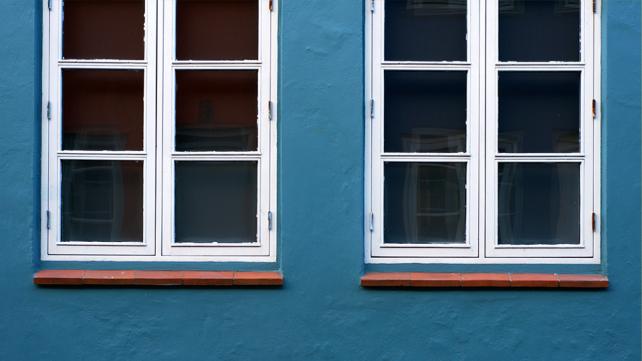
The following is an interview conducted by RadioIslam.com's Sr. Itrath Syed on Muslims participating in the political process in North America.
IS: Assalamu alaikum and welcome to RadioIslam.com. Today on our panel. We're going to be discussing the electoral process in America. Our panelists today include Br. Asim Ghafoor, who is a legislative assistant to Congressman Ciro Rodriguez.
He's joining us online from Washington DC Our other panelist is Br. Mahdi Muhammed, a computer engineer and an internet Dawa activist who's joining us online from San Antonio, Texas. I welcome you both.
Assalamu alaikum.
AG: Walaikum as Salam Thank you.
MM: Walaikum as Salam
IS: The first question I'd like to ask each of you is, as Muslims, what do you feel our role is here in North America?
AG: I'd like to answer that first, if I may. I see our role first of all as Muslims who either came from another country or embraced Islam on our own here. And secondarily as taxpaying American citizens who have a role in the local and the national political scene mainly to see how our resources as Americans are being spent and how policies that affect us and our children and our families are being enacted. IS: Br. Mahdi would you like to respond to that?
MM: Yes. We must understand that Islam is a Deen (way of life) and a Deen encompasses every aspect of life including politics, including worship, including anything that affects us as a human being.
So if Allah says to pray, we have to pray in accordance to Islam. If Allah says to fast, we have to fast in accordance to Islam. If Allah says to be in politics, it must be in accordance to Islam. In Islam, benefit can only come from that which is Halal (permissible), so if we as people in this country, in a non-Islamic state, try to benefit our status in this country we have got to do it in accordance to Islam.
In Islam the end does not justify the means. I cannot say 'Since I'm in this country and I have laws imposed on me then I must partake in the system so I can change it'. No because Muhammad (peace and blessings be upon him) and the Sahaba (the Prophet's companions) were also in a country that was not Islamic. They also had the chance to partake in that system, to change it from the inside out, but they did not. They insisted that Islam is the only law that is the only law that is a valid system in the land so they strove hard even though they suffered, some were tortured and killed, etc. They still strove hard so they could see Islam being applied.
So the thing in this country, we have to discuss what do we do in this country? Follow their laws or do we follow the Islamic laws. Do we assimilate or do we try to maintain our Islamic identity.
AG: If I may Br. Mahdi, I don't see why we have to have a distinction on whether we follow our laws and we follow their laws. While I understand there are some areas where there may be a question and we obviously have to apply our own knowledge and our own analysis on certain issues.
But in a large part, there is a way for us to both practice our Islam, raise our children and have our families in an Islamic environment, while still complying with laws. For example, paying taxes. There's nothing in Islam against paying taxes and I think if a Muslim were to argue that paying taxes to a non-Muslim government is Haram (prohibited) and therefore they won't pay their taxes, I believe they're violating another tenet of Islam which says you must abide by the rules of a society in which you live as long as those don't contravene Islam.
So for example, if you have a Muslim out there, and this is hypothetical, who's objecting to pay taxes and is being sent to prison or being punished in some way for not paying taxes, I think that's sending the wrong signal. That says that Muslims are basically objectors and they're not people who are members of the community.
MM: Taxes are sometimes forced upon us. Like I'm forced to pay car insurance. I cannot say because I want to go against the system, I say you know I don't pay car insurance because I am forced to pay taxes or forced to pay car insurance but I'm not forced to vote. I'm not forced to partake in the system so I cannot equate being forced to do something to having the choice to do something.
Also, Muhammad salallahu alaihi was Salam (peace and blessings be upon him) said in a Hadith there is no obedience to the created in disobedience to the Creator. So I cannot say I have to abide by the laws unless the laws do not conflict with Islam. If it does then I don't have to obey it.
If I'm forced to, yes. Yes I do have to pay taxes. But if I'm not forced to pay taxes, I won't pay taxes. Understanding that Hadith that there is no obedience to the created in disobedience to the Creator.
IS: If I can pick up on that, you say that as Muslims here we are forced to pay taxes and we do. So do each of you feel that Muslims should have a role in how that tax money is spent?
AG: That's the point I was starting out with. Whether or not we're forced to pay taxes or not, we do pay them and our tax money, whether we like it or not, is spent every year.
One reason why Congress is still going to be in session in September is that they still have to spend the remainder of the $1.7 trillion which they expect to spend next fiscal year. That's a lot of money, obviously, which, I don't want to estimate how much Muslims have contributed to that pool in the tax, but $1.7 trillion is going to be spent on our defense budget, on social security, on public programs, on international foreign affairs issues.
It's going to be spent across the board and I believe that unless Muslims have a say through their political system, which is the only way to really have your voice heard, we're not going to have any impact on how that money is spent. And if it's going to be spent on abortion, if it's going to be spent on all kinds of issues which mainstream Islam opposes, then we will be asked, 'when your tax money was being spent on all these areas, where were you? When your tax money was being spent to subsidize other things which are against your religion, where were you?'
I believe, that while we have to be realistic and recognize that ultimately some money will be spent on things which we may not agree with, we have a duty to speak out and make sure that it does get spent in areas which are Halal and are enjoining the good and forbidding the evil.
MM: This system also engages in interest and interest is a sin in Islam. And if you want to say, 'what can we do to make sure taxes go to Islamic causes or to help us', etc. it's still wrong to partake in a system that allows interest.
Interest is a crime in Islam. And even though we are forced to pay taxes I don't have to tell the government that doesn't even care about Islam, to spend in the cause of Islam because this is a system that is based on interest and interest is to profit them, it's not to profit us.
I cannot say if you spend for an Islamic cause then everything is okay. No. It's still wrong because the system still says that interest is okay. So if you want to partake in that, you are making that system stay even longer.
Mohammed salallahu alayhi was sallam and the Sahaba did not try to make the system of Quraysh stay longer. They tried to abrogate it. They tried to replace it with Islam. If you insist on us with these excuses of saying 'well, if we tell the people to spend taxes in the proper way, it's still the system that is still dealing with interest, still sending aid to Israel, bombing Iraq, etc. so how can you justify that despite the fact that this is a system that allows interest, allows oppression of the Ummah (the worldwide Muslim community), allows sin, allows all types of evil, even though people say I could tell them to put it for Islamic causes. So what?
AG: That is a so what if I must say. The so what is, I'm paying these taxes. This tax money is, like you said, enforcing an unfair embargo on Iraq, it's bombing Iraqi civilians, it's paying maybe one-third of the budget. It's paying interest on bonds as high as 13 percent which the government, for its own reasons, has not paid off.
So yes, I can see to that point quickly that there are a lot of outlays from the government which go towards things which Muslims would differ with. But the fact that you're paying the taxes whether you're forced to or not, to me, makes you part of the system. And once you're guilty as charged, so to speak, I believe it's our duty to make sure that that is minimized and Insha Allah (if God wills it) one day eliminated.
Arguing that the system is based on interest, I think that's going beyond the scope of this discussion. This discussion I believe is going to go towards saying, whether or not we say this, should we be voting for people who are then going to be part of this system which you're calling the corrupt system, and that's where I think the real debate is going to be. I think we should go a step further.
Other than just making our voice heard, I believe we should step up to the plate, publicly support candidates and even run for office because we need that much involvement in the system in order to make a difference.
MM: I heard you using the excuse that I'm part of the system. No. This is not true because I'm forced to be part of a system that I don't accept. That doesn't justify anything I do to support it. If I'm forced to do a certain sin or a certain act that is against Islam, I don't have to continue to do it if I'm not forced to.
I cannot say if I'm paying taxes I'm part of a system. I'm not part of a system I chose to be in. I'm forced to pay the taxes. So I cannot equate being forced to with being given the choice to. Also, this system is not governed by Islamic law, and Islamic law is the only kind of law according to the Quran and Sunnah. If you want to prolong another system, that's your choice because Muhammad salallahu alayhi was Sallam and the Sahaba did not prolong any system other than the Islamic one.
Even if the Sahaba were forced to recant their faith or forced to recant anything Islamic they still held fast to Islam and if we present ourselves to the public or to any group of people we must present ourselves as Dawa carriers not as part of the system or part of the collage or part of the puzzle. We must be part of the Dawa carriers that propagate Islam as a Deen to the whole world. It's not to propagate Islam as just a faith you practice on Friday or go to the mosque and fast and pay charity.
Islam is not that. Islam is a Deen. So if we propagate ourselves as followers of this Deen, we have to propagate this Deen. Not just say, 'I practice Islam but I support so and so'. No. This is not the Islamic path of trying to establish anything Islamic or anything just. Justice according to Islam, is when you forbid the evil and enjoin the good. To enjoin the good is to enjoin what Allah made Halal and abrogating or banning the wrong is what Allah made Haram. So I cannot mix their standards with Islamic standards.
AG: Getting back to that first distinction you were making. The way you make it seem is if we don't have a Shariah (Islamic law) as the law of the land, and, I'll concede, that's not the case here, this is a land by the people for the people, the people have sovereignty here, we don't have Shariah. Allah is not a sovereign in America and I'll concede that point, but Islam makes a distinction between that.
The Prophet Mohammad salallahu alayhi was Salam did not say you must live in Dar ul Islam. There was this other entity, Dar ul Harb, where basically it is conceded that Muslims will indeed in that time, which was the case, and in the future live in a place where they're not sovereigns, where their law is not sovereign.
IS: Actually, if I could just interrupt here for just a second, I believe that terminology was never actually used by the Prophet Mohammed salallahu alaihi was Salam. Either Darul Harb or Darul Islam.
AG: Okay, it's well recognized now the distinction about Muslims who live in the West, for example, and Muslims who live in either so-called Muslim countries or in countries that really do have (a Muslim government).
IS: Yeah, but I think what I'd like to emphasize is that from the standpoint of looking at the pure Sunnah, Prophet Muhammad salallahu alayhi was Sallam never conceived of the world as divided into categories like that. It was understood that Muslims would live on the earth and the earth belongs to Allah.
AG: Okay. But there is a distinction between when the Prophet Mohmmad salallahu alaihi was Sallam still lived in Makkah before he made his Hijra (migration) and then when he went to Madinah and set up the Khilafah so you?re saying that after he set up the Khilafah in Madinah, there was no more distinction.
IS: No. What I'm saying is that that specific terminology of Darul Harb and Darul Islam is not from the Hadith. That's terminology that came into being much later.
AG: Okay but I'm using that as an example to show where scholars have been able to, rather than create a so-called Islam in America or German Islam, which I am against, I don't know where people come up with that, although I'm sure people have brought that kind of thing up, avoiding that type of a discussion, because Islam is for all times, for all places, I believe there is a way where Muslims can work within the Islamic framework and make sure that their own institutions that they develop, whether it's an Islamic center or anything, would be based on Shariah, based on concepts where Allah is the sovereign, and working within those types of institutions, then working within, in this case mainstream American institutions, we can establish an Islamic character and make our presence known without compromising, as Br. Mahdi thinks that we would basically compromise if we work within the system here.
I believe that there is a way where we can join in a political movement or run for office or contribute to candidates and hold fundraisers and other types of debates where we would still keep our Islamic character and I believe that is the way of the future for Muslims to be involved here in the West.
MM: A true Islamic character is not just, you know, my name or my clothes or my accent. True Islamic character is the person that practices Islam and understands Islam as a Deen and if you understand Islam as a Deen then you won?t just say 'well I'm Ahmed or I'm Mohammad and I'm from this country or I practice this faith and I pray on Friday and I go to the mosque.'
The Islamic character is a person that sees Islam and practices Islam and propagates Islam as a whole. So I cannot say, 'well, if I'm in this country, and I'm trying to give a so-called Islamic voice in this country, I do it according to their rules, according to their way, according to their taste' because the true Dawa carrier is not a person who tries to please the people to make them happy.
The true Dawa carrier tells the truth as it is and of course in a clear and in a nice way. If you are a Dawa carrier or if you carry the Islamic character you would not say, 'well I'm Ahmed or I'm Mohammad but I want to vote for so and so because I want to have an Islamic voice in this country.' An Islamic voice is of course the voice that propagates Islam as a whole. This person doesn't?t say 'Islam is my culture or Islam is my background, my name.'
AG: So, I think we're kind of going in circles here. I think the point that the listeners out there should go home with, if nothing else from here, is the point that I started with, that's what politicians do, they come up with the same thing and they just keep repeating it, but the reason is that?s the message they want to convey.
We are here for a reason whether we moved here for Dawa, whether our parents came here and it's our home or whether we grew up in this community and then became Muslim and we stayed here as opposed to moving to another place where there is more Islam in the society. We are here for a purpose and I agree with Br. Mahdi that we are here not just to be nice to people, not to say great things about people but to bring truth and justice and Islamic ways to this country.
Whatever role we're in, whether it's in the private sector or the public sector, I believe that we have a duty, not just something nice to do, a duty to learn the ways of the West, use those techniques, build those institutions that do develop in the West with our own knowledge, our own understanding of Islam as the foremost motivation for doing it, and excel at it.
And there are countless examples in the Quran, the way Musa alaihis Salam (peace be upon him), Prophet Moses was brought up in the house of Pharaoh himself. Nobody was telling Moses, 'oh why are you this, Pharaoh's so bad, he thinks he's the god of the sun, why are you doing that?'? Well Allah sent him for a reason. I'm not saying we're all Moses here but we can learn a lesson from that on how we can rise up in the ranks.
Same thing with Prophet Yusuf alayhis Salam. He became secretary of agriculture for all practical purposes in another land which wasn't an Islamic country or at least a God-fearing country. It was a people who relied on dream interpreters, I?m sure they were pretty backwards in a lot of things they did there. Yet here he was, the governor. Nobody told him, 'oh you shouldn't become a government official there because their government is based on something else.' He became the highest ranking official in the land.
I believe those are the examples that Islam teaches us where you not only get involved but you excel and you make sure that when you become in a position of responsibility, you dispense justice in accordance with Allah's will. Insha Allah (if Allah wills it), when Muslims do become more active as members of Congress or in a Cabinet maybe in the future, that they will do that.
That's going to be the big challenge. I'm not saying it's easy, but that is a challenge. We're going to make sure, those of us Muslims who are involved in politics, that our Muslim leaders who join the mainstream will uphold those principles.
MM: Let's be clear that those examples of Prophets partaking in the system are pre-Islamic. Allah gave us our own pattern, our own way, our own practice of trying to implement justice. Justice can only be applied if you apply the Ahkam (rules) of Allah or the Ahkam of Islam. I cannot say that if we apply 20 percent of Islam or 80 percent of Islam and 20 percent something else that it could be some type of justice or some type of fairness. No because justice and fairness in Islam can only happen if you apply Islam not part of Islam, not 20 percent of Islam, not even 99 percent of Islam. It must be 100 percent Islam.
I cannot try to mix Islam with Kufr (disbelief) and expect good to come out of it. No. I must strive and seek to see all of Islam applied.
AG: I'm going to differ with you on two points. First of all, you said that this is pre-Islamic. Islam teaches us clearly that these were all Prophets of Islam and we have to accept the fact that Allah put a whole chapter, Surah Yusuf (in the Quran) just talking about Yusuf.
To me, He didn't just put it there just because it was a nice story to tell. Allah put it there, in my view, to give a lesson to us. At the end He didn?t say 'oh and by the way don?t do this'. Astaghfirullah (I seek Allah?s forgiveness). Sorry to sound facetious. Allah did not tell this whole story to just to say 'don?t do it that way'.
On the other hand, I can see this quickly that we're not Moses, we're not Yusuf. I'm not going out there telling anybody you know that we're here for a reason and that's our destiny. All I'm saying is that there's a lesson to learn from them. That there are ways that you can work justice and truth in a system which is foreign to that. In this case, even more foreign. I mean anybody can argue that the Pharaoh of Egypt is ten times, 100 times worse than what we have here. At least the president of the United States doesn't say he's the Lord of the sun. We have a lot of other problems but that's not one of them.
The other point that I would differ with you with on is this concept as you were ending your last comment, you make it sound like you're quantifying Islam, 20 percent, 80 percent. I think Islam is bigger than that. I think Islam is not just a system out there which is mutually exclusive of everything. Islam encompasses all of these things.
There are some people out there who want to try to tinker with Islam, who say, 'oh yeah Islam is democracy'. I'm not saying that at all. I'm saying that Islam encompasses very broad principles and those principles are things which we need to apply and we need to find ways to apply no matter where we are and in what circumstances we find ourselves.
That's the challenge for us, whether or not we choose to go into politics I believe another lesson I would like to leave the viewers with today is to find ways where we can look at the institutions here in the West and I'm not saying trying to show the Americans 'oh look we agree with you on these things too. See look how nice Islam is.' No, not at all. We're Muslims, we?re Islam, we have our own faith. Whether it matches or not is another point.
Our goal is to make sure that what we're doing here doesn't contradict with Islam. I believe it does not, as far as politics and voting. The other point is how we can bring Islamic principles to bear on the things we oversee in our private and lives here. .
MM: In the Quran it says that anyone who doesn't rule by Islam is either Kafir (disbeliever) or Zalim or Fasiq. If I vote for a person that would not rule by the Ahkam of Allah, he is a person that is a Zalim or a Fasiq or a Kafir. Allah says to rule by what, Islam or by the Ahkam of Allah so I cannot pick up excuses, saying, 'well I'm in this country, I'm this, I'm that, I'm forced or not.'
The fact is Allah gave us orders and Mohammad gave us orders to apply and rule by Allah's laws. Just like Allah says, as I said earlier in the show, if Allah says pray, we pray according to Islam, if Allah says to fast, we fast in accordance to Islam. If Allah says to give charity, it must be in accordance to Islam. If Allah says to rule, it must be in accordance to Islam.
So if you vote for anybody that would not do something in accordance to Islam, you are going against that. It's like telling people, it's like telling the Ummah to pray according to the Christian prayer or the Hindu prayer or to fast according to the Hindu fast or to pay charity according to the Hindu charity. No. Everything must be done according to Islam.
If we're given a way to do it, we must do it. Allah told us to pray and the Sunnah explains to us how to pray. Allah told us to fast and the Sunnah explains to us how to fast. Allah told us to implement Allah's laws and Allah told us how to do it. So I cannot make any excuses and tell people, 'well, if I'm in this country, if I'm being oppressed or not or if I'm being forced to or not, and we have to speak out and we have to have an Islamic voice. No.
The Islamic voice is the true voice of Islam. Islam is to call to all of Islam. It's not just to say, 'well Islam taught us to obey the law of this land'. No. Islam told us to not obey the creation in disobedience to the Creator. Allah says to rule by what Allah has revealed. Allah says Kafirs are not supposed to have a way over us. We must obey Islam in all aspects of life, including politics. Voting for a person who would not rule by Islam or follow Islam in any way, shape or form, that is going against Islam itself.
AG: Well, Mahdi I think there's a little stretch here and I'm actually speaking out of ignorance but I encourage the viewers maybe look up those verses that you mentioned. I believe they're in Surah Maidah (the fifth chapter of the Quran), about how you should rule by Islam otherwise you're a Kafir, Fasiq and I encourage you to look up those verses and see the context of that.
But my understanding of those particular verses which you mentioned is that when you are, kind of like the story I was giving of Musa and Prophet Yusuf, when you're in a position of power, when you're ruling, when you're Imam of some area, whether it's a religious group or whether you're in a position of secular power, you are commanded by Allah to rule according to Islam.
I guess we could make a political argument that in America, the people are rulers because they're sovereigns and they're voting, maybe that's the argument that you're making.
MM: Yes, yes.
AG: But I don't believe that's the context of, and again I'm pleading ignorance, perhaps the viewers can look it up so they can consider on their own. I believe the verses are talking specifically about people who are in a position to dole out rules, laws, funds, resources in any kind of way. And they're the ones who are told they're going to be judged.
And often the Prophet Mohammad salallahu alaihi was Sallam would often say himself the ruler if there is any suffering, any hunger, any sort of misfortune, anything that befalls anyone among his Ummah, among an Imam's followers, is a sin or reflects negatively on the leader on the ruler because it's his or her responsibility to make sure that there's all equality and there's justice among the people. I believe that's the context of those verses.
When you're in a position of responsibility, you need to mete out justice and you need to rule according to Islam and that's what I believe that is. But as far as making the stretch to say, therefore you shouldn't vote, I don't think there's anything in the Quran which directly would address that.
IS: Just to wind it up, if I can get final comments from both of you, very short ones?
AG: I'd just like to thank Itrath for the show and once again tell the viewers out there it's not easy. Our challenge here is to be able to stand on the Day of Judgment in front of Allah and be able to know that what we did was the right thing. Not the next best thing, not because we were forced to, not to make excuses. But to say yes Allah we did it, we found ourselves in a particular situation, we could conceal, we could have moved, we could have left to another country, we could have gone somewhere else. We could have made our own community but we chose this path.
I want to encourage Muslims out there to think on their own for their own souls, for their own sake. What they did in this life, whether for a living or whether on the side, that it was something that established justice, established truth, established Islam in their own family in their own community, in their own country and that's the message I'd like to give. That we Muslims here on Capitol Hill, Muslims who are involved in politics should have that and I remind myself first and then you also that anything we do with the right intention, may Allah accept it. And anything that I may have said or people may have interpreted that I said which was wrong or misguided, may Allah forgive me and I ask for His forgiveness.
MM: I'd like to tell you people that Allah ordered us to obey Him and obey Him only and we cannot associate in any way, shape or form a partner or a competitor with Allah. And that includes having a system that goes against Islamic law or going against the teachings of Mohammad salallahu alyhi was Sallam that is not in accordance to Islam and we cannot insist that if we can't beat em' then let's join em'.
If Islam ordered us to 'if we can?t beat em' join em' then it's okay, but Islam did not so we cannot insist to partake in a system that goes against the Islamic laws, the Islamic teachings and the Islamic concepts. I hope that people understand that and understand the true position of Islam that Islam is a Deen and each Deen has its own way, its own pattern, its own teachings, its own concepts and we cannot try to ever compromise Islam with anything else.
IS: I'd like to thank you both for being with us here on RadioIslam.com.
AG: Thank you.
MM: Thank you very much.
IS: Assalamu alaikum.
AG: Walaikum as Salam
MM: Walaikum as Salam wa Rahmatullah.
Photo Attribution: http://commons.wikimedia.org/wiki/File:Two_Windows_Aarhus.jpg

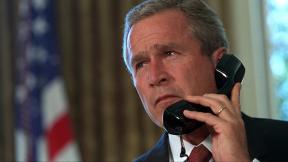
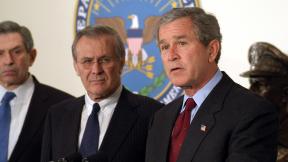
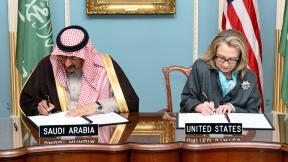
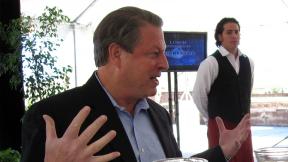
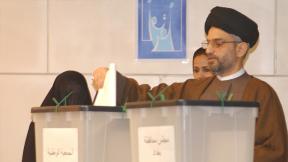


Add new comment